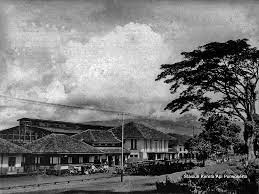History of Transportation as a Support System for Forced Cultivation in Banyumas

Colonialism Policy in Banyumas
In accordance with regulations imposed by the colonial government, in the framework of deploying manpower during the implementation of the forced cultivation system, compulsory work was carried out, which included general compulsory work (heerendiensten), pancendiensten compulsory work (pancendiensten), and compulsory work on planting (cultuurdiensten).
Compulsory work includes working on plantation land, building and repairing irrigation canals, planting, harvesting, transporting crops to warehouses or processing factories and other work on plantations. The work of preparing roads, maintaining roads, and transporting plantation products is often the most burdensome work for residents.
At that time, there were still very few good and proper road routes in Banyumas. In Java, the only good route is Daendels' route along the north coast. The southern main road, as opposed to the northern Daendels highway which was expected to be able to open the isolation of areas in Banyumas, Bagelen and its surroundings which was planned by Du Bus, failed to be made due to a lack of funds.
The construction of the planned intersection roads was never completed so that the inland areas remained in difficulties with transportation because the land roads were still in the form of footpaths. With road conditions like this, the forced planting system runs in Banyumas.
Transportation of Plantation Products to the Port
There are several ways to transport plantation products in Banyumas so that they reach the port of Cilacap, which will then be shipped to Europe. The first way is by land by utilizing existing land roads. Second, through waterways by utilizing existing rivers, and Third, a combination of the two. The wide reach of coffee plantations means that coffee cannot be brought directly to the port, but must first be collected in warehouses. The existence of coffee warehouses has encouraged the formation of coffee transport networks or chains. Compared to the transport chain for other plantation products, the coffee transport chain is the clearest.
At the beginning of the implementation of forced cultivation, 12 coffee warehouses were established in the Banyumas Residency, consisting of 2 main warehouses or final storage warehouses located at Cilacap Harbor (Orange Legi District), while the other 10 were initial storage warehouses spread across various districts in several districts. .
Transportation of Goods from the Port to the Interior
One of the activities carried out by residents in the Cilacap beach area is making salt for fishing. Salt making was the livelihood of most of the area's population before the Banyumas area was taken over by the colonial government. The salt they produce is sold to residents in various areas in the Banyumas Residency. Since the Dutch colonial government took over the Banyumas Residency and began to actively exploit the economic potential there, they also traded salt. The reason used by the government is that the salt trade carried out by residents is an illegal trade.
The colonial government then monopolized the salt trade in Banyumas and made salt a state production, the production of which was carried out by coastal residents as part of mandatory work (heerendinenstein). The production of Cilacap beach salt is relatively small, so it is not sufficient to meet the needs of the majority of the population of the Banyumas Residency and its surroundings. To cover the shortfall, the Dutch colonial government brought in salt from outside the region.
Besides carrying salt, the canoes sailing upstream were also loaded with other imported goods needed by the residents of the Banyumas Residency, such as gambier, salted fish, onions, coconut oil, fine handicrafts, iron and porcelain tombstones. These goods are imported from areas outside Banyumas, such as from Bagelen, Madura, Banyuwangi, Sumatra and so on.
Follow firmandads to stay updated on their latest posts!
0 comments
Be the first to comment!
This post is waiting for your feedback.
Share your thoughts and join the conversation.
